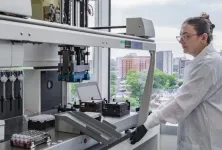(Press-News.org) BUFFALO, N.Y. – Colorectal cancer (CRC) is no laughing matter. It’s the second-leading cause of cancer deaths globally, according to the World Health Organization. But new research led by the University at Buffalo suggests that humor can be an effective mechanism for reaching people who otherwise avoid information about colorectal cancer screening or other health messaging.
The research, published online ahead of print in the British Journal of Health Psychology, found that in people who demonstrated a tendency to avoid information about colorectal cancer exposure to humorous comic strip cartoons made them more likely to agree to be directed to an online quiz to assess their personal risk for colorectal cancer. A second study found that similar exposure made them more likely to choose to watch a short video about colorectal cancer.
Health information avoidance is a defensive process people use to shield themselves from thinking about threatening ideas, such as the possibility of having cancer, or information that may require unwanted behavior changes, such as eating a healthier diet. It can take the form of avoiding seeking out health information altogether, avoiding exposure to information, or delaying obtaining information such as putting off scheduling a colonoscopy.
“We were surprised to learn that simply exposing people to funny content, in this case having people rate comics, could reduce information avoidance,” said the study’s lead author, Heather Orom, PhD, associate professor in the Department of Community Health and Health Behavior in UB’s School of Public Health and Health Professions.
“At this point we still don’t know why humor is having this effect for people who avoid CRC information,” Orom adds. “Our original hypothesis was that the comics would put people in a positive mood and that this would reduce their need to avoid threatening information by acting as a buffer against becoming too upset.”
Orom and her colleagues’ previous research found that about 20% of the population may avoid information about colorectal cancer and that the figure is similar for diabetes.
“We also know that people who avoid colorectal cancer information are less likely to be screened for the disease – close to half as likely,” she says. “Getting screened is such an important thing we can do for ourselves because colorectal cancer is the third-most common cancer in men and women and one of the most preventable through regular screening, especially if you are screened with colonoscopy.”
Routine screening for colorectal cancer should begin at age 45 for individuals at average risk, a newer guideline that may not be widely known.
“In 2021, the U.S. Preventive Services Task Force updated the screening recommendation from age 50 to 45 in response to increasing colorectal cancer rates among younger populations,” explained co-author Natasha C. Allard, a PhD candidate in the Department of Community Health and Health Behavior who studies young adult cancer prevention.
The current, two-part study was an attempt to find ways to encourage people to get screened. So, Orom and her colleagues turned to humor in the form of comic strips, like TUNDRA’s comic about Frosty the Snowman picking his nose.
In study 1, 288 individuals between the ages of 45 and 75 were asked to view one of four types of images: humorous comics, cute animals, coping messages, and streetscapes (the control group) and rate each one to indicate the extent to which they thought the comics were “funny,” the animals were “cute,” the coping images were “encouraging,” and the streetscapes were “interesting.”
Participants then rated their mood and were asked, “Would you like to receive a link at the end of this survey to take a quiz to learn more about your personal risk for colon cancer?” Those who reported avoidance tendencies were more likely to say yes.
Interestingly, viewing images of cute animals or coping messages did not increase engagement with colorectal cancer information.
In a second study, 505 individuals aged 45 to 75 were given the choice to watch either a video on expert advice on preventing colorectal cancer or a video on expert ways to take care of their feet.
Unlike in study 1, the humor and coping experimental groups reported being in a more positive mood after viewing the images than the control group, which saw streetscapes. As with the first study, being colorectal cancer screening adherent wasn’t associated with which video they chose. Also similar to study 1, the effect of the humorous comics on choosing the CRC video were larger and more positive to the extent that participants tended to be more CRC avoidant.
Orom explains that the current study differed from previous research on humor and health messaging in that prior studies examined the impact of health messages that were designed to be humorous, rather than pre-exposing people to humor unrelated to the delivery of a subsequent, non-humorous health message.
“The reason we wanted to test whether humor might mitigate avoidance is that it’s a strategy that can be incorporated into public health messaging,” Orom says.
“Perhaps starting off with something humorous gets people who avoid health information to start to pay attention to the message. Then we will need to keep their attention, and that’s what we’re working on now.”
END
Study suggests humor could help people engage with colorectal cancer information
2024-09-17
ELSE PRESS RELEASES FROM THIS DATE:
Q&A: Ethical decision-making around neurotechnology treatments
2024-09-17
UNIVERSITY PARK, Pa. — A novel neurotechnology treatment known as deep brain stimulation (DBS) can benefit patients with neurological disorders, but it involves surgical procedures with potential risks. Assessing the risk-benefit tradeoffs and the ethics in making decisions about whether to begin such treatments and when can be tricky for both patients and clinicians.
Laura Cabrera, associate professor of engineering science and mechanics, received a four-year, $1.5 million grant from the National Institutes of Health to research and develop ...
A smoother way to study ‘twistronics’
2024-09-17
A discovery six years ago took the condensed-matter physics world by storm: Ultra-thin carbon stacked in two slightly askew layers became a superconductor, and changing the twist angle between layers could toggle their electrical properties. The landmark 2018 paper describing “magic-angle graphene superlattices” launched a new field called “twistronics,” and the first author was then-MIT graduate student and recent Harvard Junior Fellow Yuan Cao.
Together with Harvard physicists Amir ...
UT Health San Antonio finds genetic risk-factor overlap between Alzheimer’s disease, and all-cause and vascular dementias
2024-09-17
SAN ANTONIO, Sept. 17, 2024 – In landmark research, scientists at The University of Texas Health Science Center at San Antonio (UT Health San Antonio) have reported the largest-ever genome-wide association study of dementia from all causes, revealing an overlap of genetic risks including neurodegeneration, vascular factors and cerebral small-vessel disease.
Genome-wide association studies help scientists identify genes associated with a particular disease or trait by exploring the entire set of DNA, or genome, of a ...
UM School of Medicine aims to accelerate basic science research and advance drug therapies with newly-created department
2024-09-17
University of Maryland School of Medicine (UMSOM) Dean Mark T. Gladwin, MD, has announced the formation of a new Department of Pharmacology, Physiology and Drug Development, which merges the Department of Physiology and Department of Pharmacology. This new Department aligns the basic science research efforts of both entities with a strong emphasis on the development of new drug therapies.
The Department will host three divisions spanning Cancer Therapeutics, Molecular Physiology, and Neuropharmacology, creating additional opportunities for research partnerships across current UMSOM Centers, ...
Can Google street view data improve public health?
2024-09-17
Big data and artificial intelligence are transforming how we think about health, from detecting diseases and spotting patterns to predicting outcomes and speeding up response times.
In a new study analyzing two million Google Street View images from New York City streets, a team of New York University researchers evaluated the utility of this digital data in informing public health decision-making. Their findings, published in the Proceedings of the National Academy of Sciences (PNAS), show how relying on street view images alone may lead ...
Mapping out matter’s building blocks in 3D
2024-09-17
NEWPORT NEWS, VA – Deep inside what we perceive as solid matter, the landscape is anything but stationary. The interior of the building blocks of the atom’s nucleus — particles called hadrons that a high school student would recognize as protons and neutrons — are made up of a seething mixture of interacting quarks and gluons, known collectively as partons.
A group of physicists has now come together to map out these partons and disentangle how they interact to form hadrons. Based at the U.S. Department of Energy’s Thomas Jefferson National Accelerator Facility and known as the HadStruc Collaboration, these ...
Cancer patients want financial screening early in care, study finds
2024-09-17
Patients want providers to reach out early and often to ask about financial needs
First study seeking cancer patient input on how they want to be screened
Findings show how to best deploy policies to screen cancer patients for financial concerns
CHICAGO --- Patients with cancer want their care team to assess them early in treatment about their concerns related to costs of care, reports a Northwestern Medicine study. It is the first time a study has sought cancer patients’ input on how they want to be screened for financial needs.
The financial impact of treatment, referred to as financial toxicity, includes direct costs, such as how much ...
Black women have a higher risk of dying from all types of breast cancer, meta-analysis reveals
2024-09-17
Breast cancer is the most diagnosed cancer among U.S. women and the second leading cause of cancer death. Black women who develop breast cancer are around 40% more likely to die of the disease than white women, but it was unclear until now whether this disparity exists across all types of breast cancer. Now, a meta-analysis led by Mass General Brigham researchers shows that Black women have a higher risk of dying from breast cancer for all tumor subtypes, and the size of this disparity varies from 17-50% depending on the type of breast cancer.
These findings, ...
‘Good complexity’ can make hospital networks more cybersecure
2024-09-17
In May, a major cyberattack disabled clinical operations for nearly a month at Ascension, a health care provider that includes 140 hospitals across the U.S. Investigators tracked the problem to malicious ransomware that had infected an employee’s computer.
Health care systems offer juicy targets for cybercrime because of the valuable personal, financial, and health data they hold. A 2023 survey of health information technology and IT security professionals reported that 88% of ...
Up to one-third of antibody drugs are nonspecific, study shows
2024-09-17
Integral Molecular, a leader in antibody discovery and characterization, has published new research in the journal mAbs, revealing that as many as one-third of antibody-based drugs exhibit nonspecific binding to unintended targets. A serious concern, off-target drug binding is a significant cause of adverse events in patients, with the potential to even cause death. Analysis of antibody off-target binding across different phases of clinical development suggests this to be a major cause of drug attrition. Early specificity testing could improve drug approvals and patient safety.
Learn how antibody developers can use the Membrane Proteome Array™ to assess specificity ...



